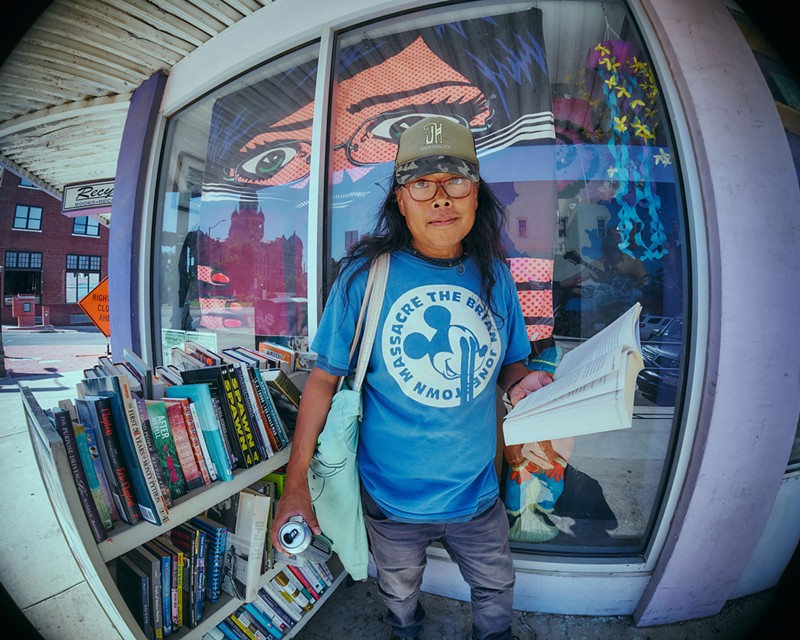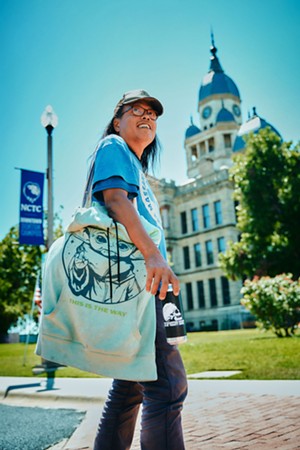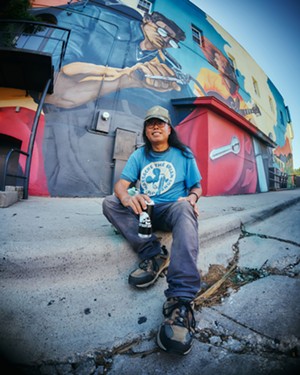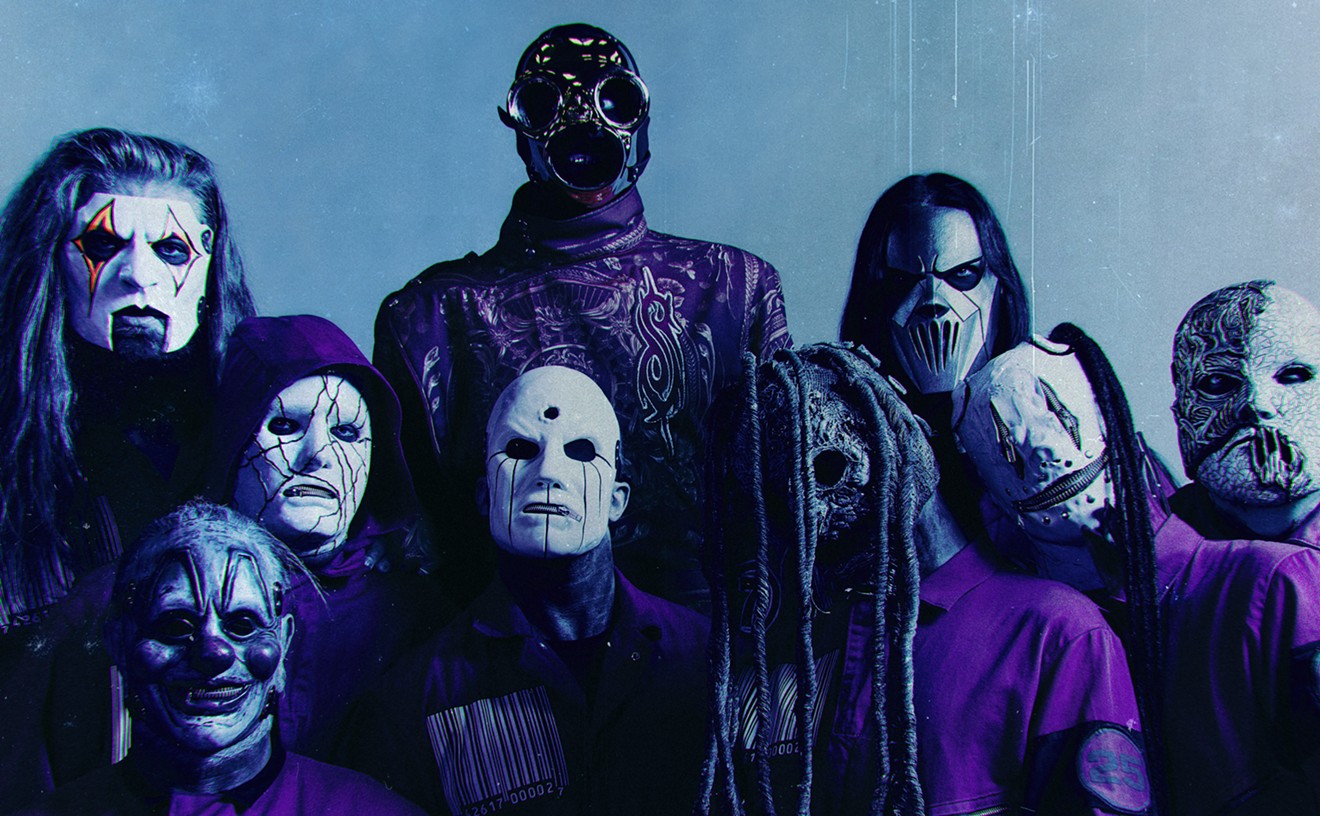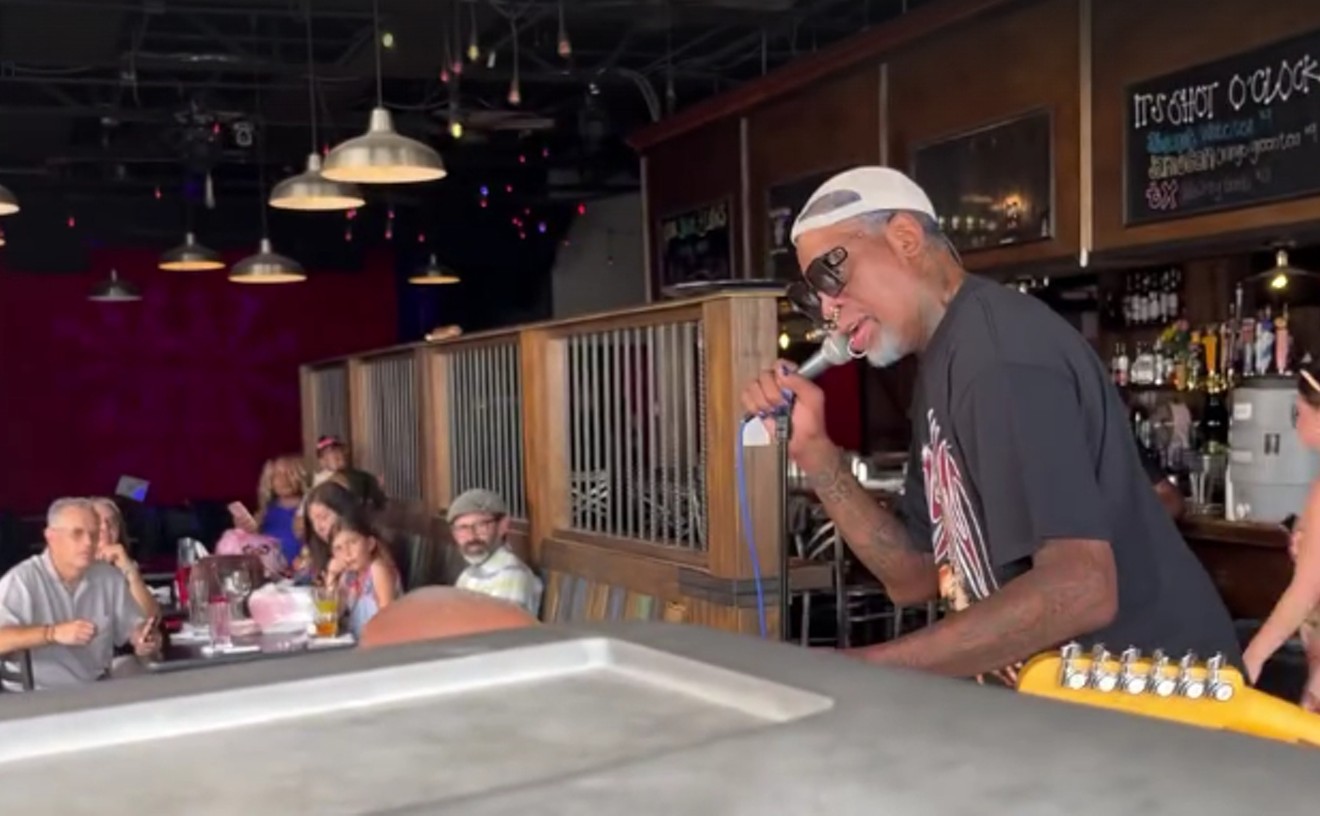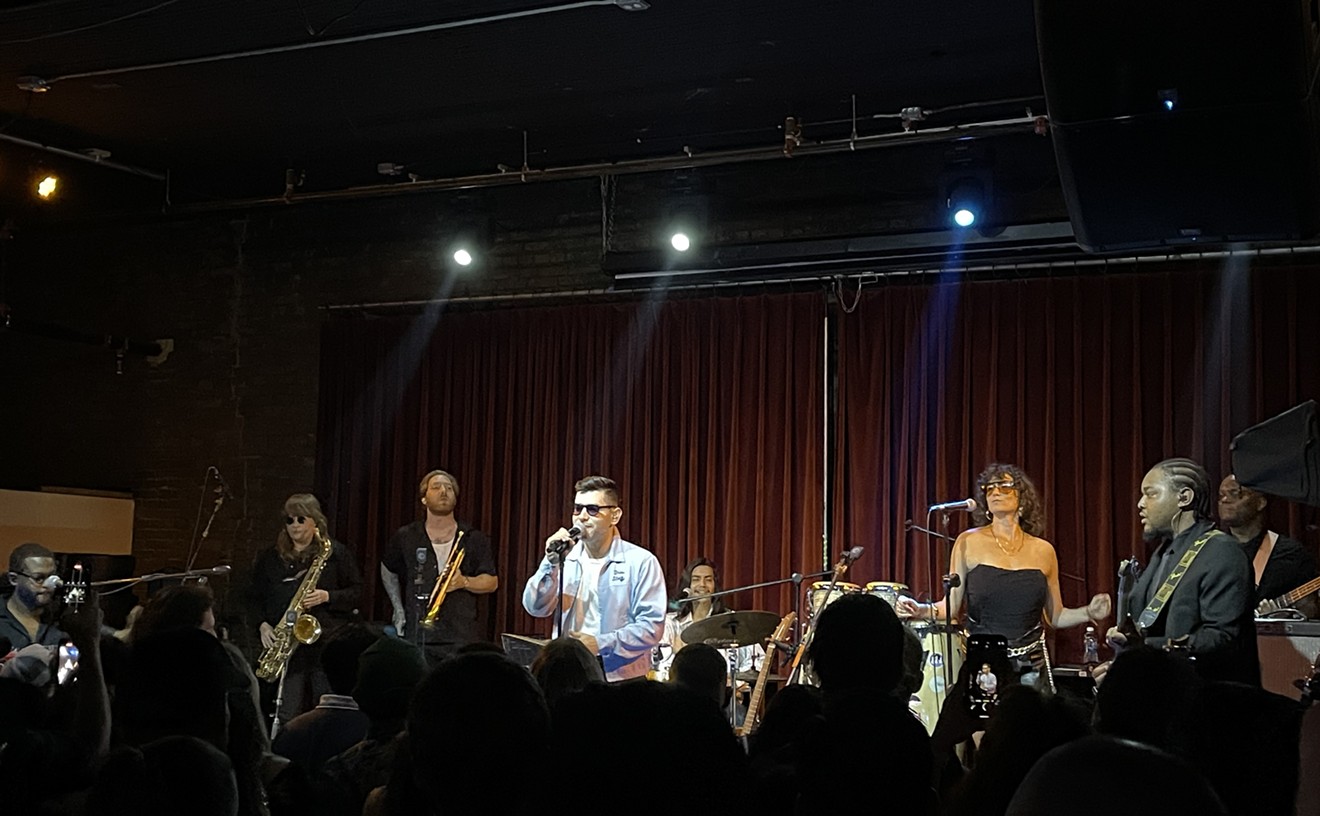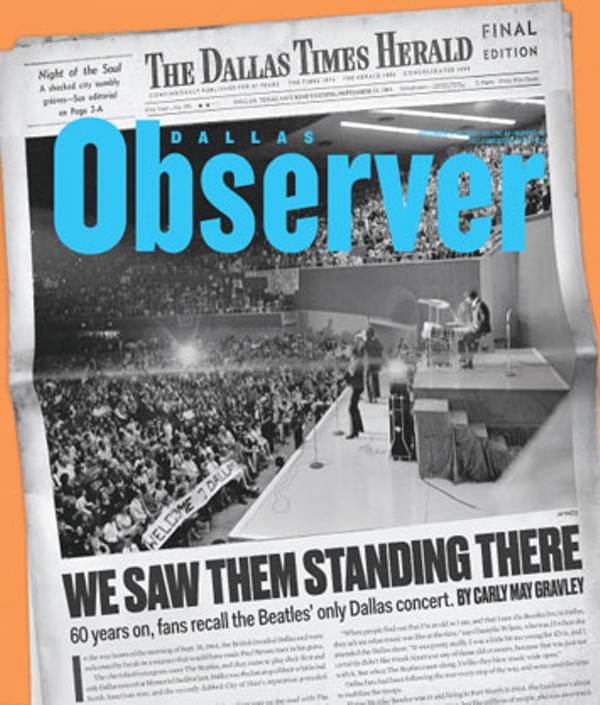“What great rock ‘n’ roll does is convert all who witness it into believers,” Crimaldi philosophizes via his Rock Philosopher blog, a site he started in 2013 when he was covering Bangkok’s underground music scene. “It's like watching Jesus rise from the dead, only he's tattooed, horns coming out of his fucking head, and a guitar hanging around the neck.”
Despite Crimaldi's plans, Jesus isn’t rising from the dead with a guitar around his neck on this Friday night, and neither are Haskins and several other musicians who backed out of the event at the 11th hour. It's an alcohol-free one. The new owner, Crimaldi says, doesn’t have an alcohol license yet and doesn't want the responsibility that comes with hosting a BYOB event. If the police were called, and an officer got injured trying, for example, to remove a drunken mostly naked sweaty singer from the stage, the property owner could be held liable to cover the officer’s hospital bill, according to the city manager's office.
Inside the Tex-Mex restaurant, Crimaldi sits behind his drum kit, which a friend recently purchased for him, in an open area in the back. The crowd comprises mostly musicians on the bill and includes Lynn Brooks, a Denton fixture known as the “Dancing Man.” A retired sound engineer, Brooks resembles Saruman from The Lord of the Rings with his long white hair and beard. Crimaldi calls him “The White Wizard” of Denton's music scene, especially given his 50-year connection to it, fixing amps for local musicians such as the Grammy-winning Brave Combo.
Dressed in black, with his dancing shoes on, Brooks, who's in his early 70s, struggles to stand still at El Cucuy.
“I can't sit down,” he says. “I have to dance.”
He begins casting spells with his feet as he vibes with Crimaldi's beat.
A trippy jazz funk improvisation reverberates off the pink walls in a plug-your-ears kind of way. Sporting long dark hair, thick glasses and a red T-shirt that reads “Denton Fucking Texas,” Crimaldi lays down a funky beat for guitarist Joey Cerda, a musician 25 years his junior who improvises jazz standards.
Crimaldi, who's 50, has been temporarily staying with the White Wizard, but signs suggest that the Shire may instead be the land of Mordor. He knows that he’ll be on the streets again. He’s no stranger to them, not since his arrival (on a friend’s recommendation) in 2019 from Austin via New Orleans and Thailand, where he spent more than a decade chronicling his adventures in the local music scene as the Rock Philosopher.
Since his arrival, Crimaldi has become part of several local bands, including Electric Mayhem, The Norah Jonestown Mascara and Stabbing Unicorns. He’s also one of several hundred people locally who struggle with homelessness. Housing affordability is difficult for wandering bards such as Crimaldi not only in Denton but for most Texans, according to a recent poll by the University of Houston and Texas Southern University.
Though recognized as one of 60 music-friendly cities by the state, Denton doesn’t have the safety nets in place for musicians like some of the other music-friendly cities. Austin, for example, has the Austin Tennant's Council, which offers tenants help, and a program called Housing Opportunities for Musicians and Entertainers, which offers housing assistance grants up to $500, though applicants must be at least 55 years old and have been working as a musician for 20 years.
There’s also the Health Alliance for Austin Musicians (HAAM), which has provided access to more than $144 million in healthcare services to 6,700 musicians in seven counties since 2005.
Rachel Blair, the chief operating officer at HAAM, says membership has increased 61% since 2016 and that 70% of HAAM’S musicians are engaged in work outside of music.
“What they tell us is that despite wanting to do music full-time, they really have to do full-time traditional employment or work outside music to have any kind of sustainability. Think about how tired you might be. Your left-over energy is gone. It not only costs our musicians but also our community in terms of the number of songs written, bands formed and albums produced.”
Blair says higher housing costs caused by the pandemic and inflation haven’t helped matters.
“Think about what musicians need to survive and stay in the place,” Blair says. “They need institutional support and venues to play in that pay a decent wage. They need access to healthcare and affordable housing and community, among other things. We know that there is a direct intersection between health and housing, and if you’re unhoused, it is very difficult to maintain a healthy lifestyle and access to healthcare.”
Austin is in the Philosopher’s sights, but the Denton Community Shelter has been on Crimaldi’s mind. It’s the only 24-hour low-barrier shelter in the area. But it’s overrun with hundreds of people who are trying to escape the heat. A few have been turned away.
Being homeless has taught Crimaldi the art of the side hustle. He has turned the Rock Philosopher's philosophies into a brand that has appeared on beer, T-shirts and coffee cups. “Denton Fucking Texas” is one of those. It's printed in large letters on T-shirts he sells for $20 at local hangouts such as II Charlies on Sunset Street and Recycled Books on the city square.
Promoting and working at local music festivals is another side hustle. He worked on a stage at Fry Street and Fair, founded the two-day Beer Alley Noise Market Festival in 2019 and put it on again earlier this year. He took inspiration from the Noise Market DIY festivals in Bangkok and invited various bands he's met along his journey, including Tape Slam, a band with old high-school bandmate and longtime Vanity Fair journalist Mike Hogan.
Tape Slam has an EP releasing in September. They recently released “Calling the Night” on Spotify, Bandcamp, Apple Music and YouTube. It’s a song that Crimaldi says is about a fictional situation of a friend in the throes of alcohol addiction. He says it reminded him of Haskins.
The image of Haskins in his Speedos at a bar serves as the song’s cover art, photographed by rock photographer Curtis Smith, known for his photos of the Sex Pistols.
Crimaldi and Hogan are also gearing up for a mega mini tour of the Northeast in early October. They’ll be making stops at Asbury Park (known for Bruce Springsteen), Philadelphia and Jersey City, where they grew up more than 30 years ago. It’ll be a reunion with family and friends. It could be life-changing for Crimaldi — if he’s able to survive unsheltered on Denton’s streets.
“Tape Slam has been the game changer,” Crimaldi says. ”The whole world seems to be opening. If I have to suffer, it’s worth it. I never thought I’d have the opportunity to do this at my age or any age.”
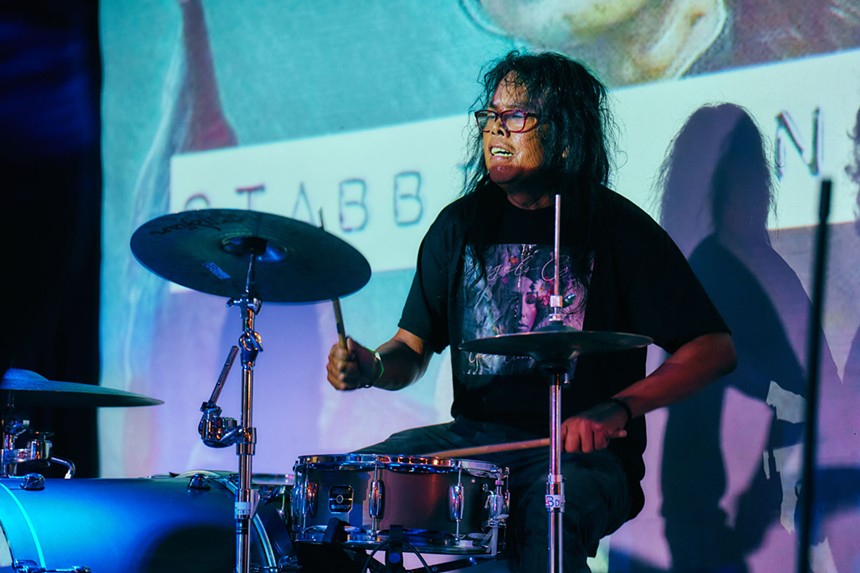
“I want my rock 'n’ roll to be dangerous, snarling, shocking and sometimes God-awful," Crimaldi writes on his Rock Philospher blog.
Christopher Durbin
The Boys Are Back in Town
Crimaldi doesn't mind the heat behind his drum kit on this Saturday afternoon in late April at Beer Alley, a few months before his appearance at El Cucuy Burritos. Performing ’90s-style indie rock on asphalt, sandwiched between two buildings, only makes the rising temperatures feel hotter. He soldiers on, energized by a shot at the limelight as he lays a steady beat for Hogan on rhythm guitar and Cerda, who’s filling in as guest guitarist. They’re joined by Killian Smith, a bassist who could be an extra on Netflix's Vikings series, with his long blond hair and beard.It's their first official appearance as Tape Slam, a project Crimaldi and Hogan began during the pandemic. Hogan had noticed one of Crimaldi’s advertisements for the Rock Philosopher T-shirts in a group page for their high-school alma mater.
“Seeing him do that and realizing that he was doing music, we started talking,” Hogan says. “I got one of those shirts. I’d been writing music and sent him some stuff. He didn’t act like that was the most annoying thing.”
Hogan started focusing on music again shortly after a divorce in 2013. He recorded a demo that received positive feedback from someone he knew at AOL Music. After setting it aside for 10 years, he sent it to Crimaldi, who offered feedback and, Hogan says, encouraged him to release it on Spotify. They began exchanging musical ideas that would lead them to a Denton recording studio in October, the parking lot of The Bearded Monk in late April and a mini tour in October.
“He has a great combination of a poetic soul, a philosopher’s soul, and an entrepreneur spirit,” Hogan says.
This isn't Hogan's first time jamming in Denton. This time last year, acoustic guitar in hand, he played with Crimaldi and Smith in Beer Alley as part of what Crimaldi had dubbed “Dharamaggedon Now.” They were celebrating Crimaldi and Hogan's birthdays with a blues improv performance. A VHS image was projected on the wall behind them. They had only one rehearsal before the performance.
“It was amazing and sloppy,” Hogan says.
A year later, in Beer Alley, it doesn’t seem like 30 years have passed since Crimaldi and Hogan last played together in a band. In the early ’90s, they formed “Aural Fixation” and played a talent show at St. Peter’s Prep, a private Jesuit school in Jersey City where they received a classical education.
Hogan formed the band in the basement of a friend’s house but needed a drummer, the “eternal quest” for bands. Then he recalled Crimaldi was a drummer.
But Crimaldi was also a heavy metal guy. A loner in thick glasses, he wore a biker jacket to school and was “barely making the grade,” Crimaldi says. He called himself a “product of glam metal,” though he was also into Danzig, Metallica and Joy Division, a band Hogan also enjoyed.
Born in 1974, Crimaldi was one of thousands of Vietnamese children adopted by mostly white families from the States and Canada toward the end of the Vietnam War. An Italian American family adopted him shortly after his birth. He grew up in a plumber’s household just outside of New York City and struggled with “being Asian in a white world.”
“I didn't know it growing up, but I was living the life of a prince compared to what life would have been in Vietnam in the post-war,” Crimaldi says.
Crimaldi didn't quite fit the plumber mold that his adopted family offered him, a path his adopted brother had taken. It probably didn't help that he had also discovered rock ‘n’ roll. Guns N’ Roses became one of his favorite bands.
“Like most things in life, you need to die to be reborn, remade,” Crimaldi writes on his Rock Philosopher blog. “I want my rock 'n’ roll to be dangerous, snarling, shocking and sometimes God-awful. Does anyone make music so they can sell shampoo and soft drinks? Where in the world is Jim Morrisson and John Lennon when you need them?”
Hogan just wanted him to ease up on pounding his cymbals. Aural Fixation wasn't a metal band. They were shooting for a Robert Smith from the Cure kind of sound for the talent show. It didn’t help them win the show.
Crimaldi and Hogan kept the band together long enough to play a few shows and record several songs. Hogan found a recording a few years ago at his father’s house and shared it with Crimaldi.
“I look back fondly on all this,” Crimaldi says. “If a fortune teller told me 30 years later we would resume playing music after living our own adventures, I would not believe it. We were different and clueless kids.”
Fried Street
A week after the Beer Alley Music Festival, Crimaldi is deep into another song by The Brian Jonestown Massacre with his tribute band The Norah Jonestown Mascara. They're on the side stage on Mulberry Street in front of Tom Daiquiris, with only a few people watching. In the past, the Fry Street Festival would draw more than 20,000 attendees to the all-weekend event. On this Saturday night, only about 100 people gather behind a tall fence that surrounds the festival and blocks sections of Mulberry and Hickory streets. The $25 festival fee could have affected the turnout. Thin Line, a free festival, was also occurring downtown. It probably didn't help that the organizer of the Fry Street Festival had misrepresented his relationship with the original festival organizers — and their blessings — to a local newspaper, a story that the Observer exposed a few months ago.
Most of the crowd gather around the corner on Fry Street in front of the main stage where Haskins, sweaty in his Speedos, slays the crowd with the Wee Beasties. He blazes through an alcohol-fueled performance that brings to mind what inspired Crimaldi to leave behind his solitary life as a gamer and become a modern-day Lester Bangs in Bangkok.
“I always loved music journalism — just needed the inspiration,” says Crimaldi, who was a philosophy major in college. “I recall doing a role-play with a friend in Bangkok. He played a rock star, and I was a Rolling Stone writer interviewing him. I dressed up, instead of a usual T-shirt and jeans or shorts. He had a hard time getting into the part.”
In 2013, Crimaldi began living his music journalism dream via the Rock Philosopher blog, the only one in the English language, he says, to cover Bangkok’s DIY music scene. He also took photographs of his experiences at local shows and music festivals and included them with the posts.
“Stone Free [a festival in Bangkok] was nothing short of life-changing and mind-altering for me and no doubt all the participants, whether they be musicians or fans,” Crimaldi wrote in a 2014 post. “Somehow I thought it wouldn't be possible to experience all 60+ bands in one weekend. I was wrong — if you count laying in your tent in a semi-sleep-zombie-state while various local acts like Wednesday or Little Fox infuse your intoxicated dreams. … I was there for all — and it was seeping into my subconscious slowly giving my life clarity and direction.”
Stone Free was not on the beaten path like the Fry Street Festival. Crimaldi writes it was an achievement for people to make it there. He credits “God, Allah, and all of the 27 Club, my friends” for making it to Kanchanaburi, a town in west Thailand known for the “Death Railway,” a railway built in World War II, claiming more than 100,000 lives, many of whom were prisoners of war and Asian laborers.
It took Crimaldi 45 minutes to navigate what he called “the music mecca of 2014” to watch Bangkok garage rock mainstays Bone Clone featuring Spike, a “theatrical mad-genius,” and fellow Chicago transplant Mike Ortiz on drums.
“The backdrop of lighted limestone was surreal and will certainly inspire rock 'n' roll theatre productions in the future. There is nothing more cyber-punk than a rock quarry off a sleepy country road — much like a scene from The Matrix ... you just had to be there,” Crimaldi wrote in 2014. “This electronified version of Bone Clone looked and sounded better than ever with cameo performances by Niall Murray of The Sangsom Massacre on bass and the sensuous suicide girl wrapped in mystique known as Tulip on synth. You can find Spike haunting a certain burger shop/rock 'n' roll institution on Asoke-Dindaeng on Tuesday nights.”
Ten years later, the Wee Beasties' performance at Fry Street Festival would have been worthy of a post by the Rock Philosopher.
Haskins and company electrify the crowd. Even the Denton police, who linger inside and outside the fence, seem to be enjoying a mostly naked Haskins as he unleashes rock ‘n’ roll that Crimaldi calls “dangerous, snarling, shocking and sometimes God-awful,” in his underwear.
Unleashing the Rock Beast
Crimaldi does his best to unleash dangerous, snarling and shocking rock ‘n’ roll in late July in front of a kaleidoscope of colors that spiral on the wall behind him on the side patio of Tom Daiquiris. A few members of Norah Jonestown Mascara join him, including Cerda on guitar, Smith on bass, keyboardist Shane Abel and Charles Tomohiro Hanson, aka “Tomo” from the Wee Beasties, who wears blue framed sunglasses, his long dark hair in braids, and plays a trumpet as if Miles Davis had possessed him for the night.They’re improvising this Friday night since singer and multi-instrumentalist Trent Reeves left the band. They’re using a revolving lineup of singers that includes Cerda and Smith, and a couple of bands are also on the bill to play, including Hen and the Cocks, a local punk band, and Neon Lemon, a psychedelic band from Austin.
The White Wizard approaches the microphone. In a black beret and glasses with round red lenses, Brooks wears a leopard print dress top and black skirt. He holds lyrics to “Hey Hey We're the Monkees,” a band that was popular in the 1960s when he was young.
Brooks struggles to cast a spell on the growing crowd with Crimaldi and company. They're somewhat off-key until Tomo picks up a tambourine and begins singing with him. Others join in. They sync up, and the audience become believers and cheer Brooks after the song. It amplifies when JoAnn Henkel from Hen and the Cocks takes her turn on the mic for a Norah Jonestown performance that showcases what the band could become with the right singer feeling their groove.
Despite the road bump with the singer, life seems good for the Rock Philosopher as the Tape Slam tour approaches. Crimaldi mentioned that he wants to reconnect with his estranged brother in October when the tour stops in New Jersey. They had a falling out in 2019. Crimaldi had been living with him when he returned home from Thailand in 2017 for cataract surgery.
But all is not right for Crimaldi at the White Wizard’s place where he’d been crashing for a few weeks. It had become the land of Mordor for Crimaldi, in part due to creative differences
A few weeks later, Crimaldi is escaping the triple-digit temperatures at the library, the university and the local bars during the day and evening. At night, he finds refuge in spots known only to those who have spent time on the streets.
“There are guardian angels in my life and, truthfully, everyone I ever lived with here is one of them,” Crimaldi says. “I have survived on the kindness of others for a long time.”
Crimaldi had a meeting with the Salvation Army to learn about his options for replacing his ID for the upcoming tour. Homeless advocates say it's the first thing people lose when they become unhoused. The several weeks' wait to get it isn't ideal. He's not sure if he'll be able to replace it.
“The last five days have been really bizarre,” Crimaldi writes in an early August message. “Times like this you realize who your friends are. I suffer for my obsession. Trying to sell the drums now.”
It's a five-piece Gretsch Energy drum kit with Zildjian Planet Z cymbals, he wrote in a Facebook post. He listed it for $500.
He's also booking shows again. He wants to do a small DIY music fest in Wichita Falls in the spring. He'd recently played a couple of shows there with Electric Mayhem. He’s searching for a place that allows camping. He figures a few hundred people max.
“Numbers don't matter more than intimacy,” he says.
Porta Potties would be ideal.
Toasty Bros, a local beer maker, is also about to drop another batch of the “Rock Philosopher Undead Ale.”
“I shared the idea with Toast along with short narratives about the magical properties of the beer and how the undead would use it against the humans,” Crimaldi writes in an email. “I spent quite a lot of time imagining silly camp narratives around beer.”
Launched in 2020, the undead ale sold well in many bars downtown, Crimaldi says: “The words, when put together, have a fun mystery. The skull is iconic. It was a winning formula.”
But not enough to keep him from the streets.
Morgan Loftin from Denton Music and Arts Collaborative (DMAC), a local nonprofit that helps subsidize healthcare coverage for musicians, says she has received messages from musicians like Crimaldi who have lost their jobs and were in the midst of homelessness. But the nonprofit doesn’t offer a program for housing. It can barely subsidize healthcare coverage for 70 musicians.
“Right now, we are capped and struggling to get enough donations to cover our operating expenses,” Loftin says.
Cerda, who has lived in Denton for 10 years, is one of those musicians who has tried to get help from DMAC. Though he isn’t homeless like Crimaldi, he and other musicians have been struggling to find affordable rent in a city once known for it.
“I used to be able to work a full-time job at Domino's and pay my rent on a two-bedroom apartment with another person, which was about $400 each,” Cerda says. “Nowadays I have a studio apartment at $1,200. I’m living by myself and self-employed [fixing amps and guitars]. I find as much work as possible to keep my head above the water and my ass off the street and to make the rent check.”
Crimaldi doesn’t think of himself as homeless. He’s more like the buskers who pass through Denton long enough to earn money by playing on the square. Except Crimaldi’s stop has lasted longer than expected. He worked for about a year at a factory on the outskirts of town, but as Loftin points out, working to afford the high rent and grocery bills while also pursuing music passionately can lead to burnout.
“Finding something to work with your schedule as a musician and artist is difficult,” Loftin says.
It’s also difficult to find housing when you land on the streets. Most places require a stable rental history, good references and a household income that is three times the high rent.
An ID is required, which Crimaldi was finally able to secure.
Crimaldi is considering busking for money on the courthouse lawn. He says he just needs to find a way to get his drums from the White Wizard’s house.
“Being unsheltered isn't special,” Crimaldi says. “Plenty of my friends have been there. My own actions have led me here. With it came great things. Let us not forget this is simply my process revealed. No music I am involved in would exist without the very bizarre life choices. … If I can be productive while being unsheltered, maybe that's a message there for our throwaway society.
“I'm not unhappy, just inconvenienced. This is the way of the Rock Philosopher. We embrace minimalism. Through day-to-day suffering, truth and character are also revealed.”

